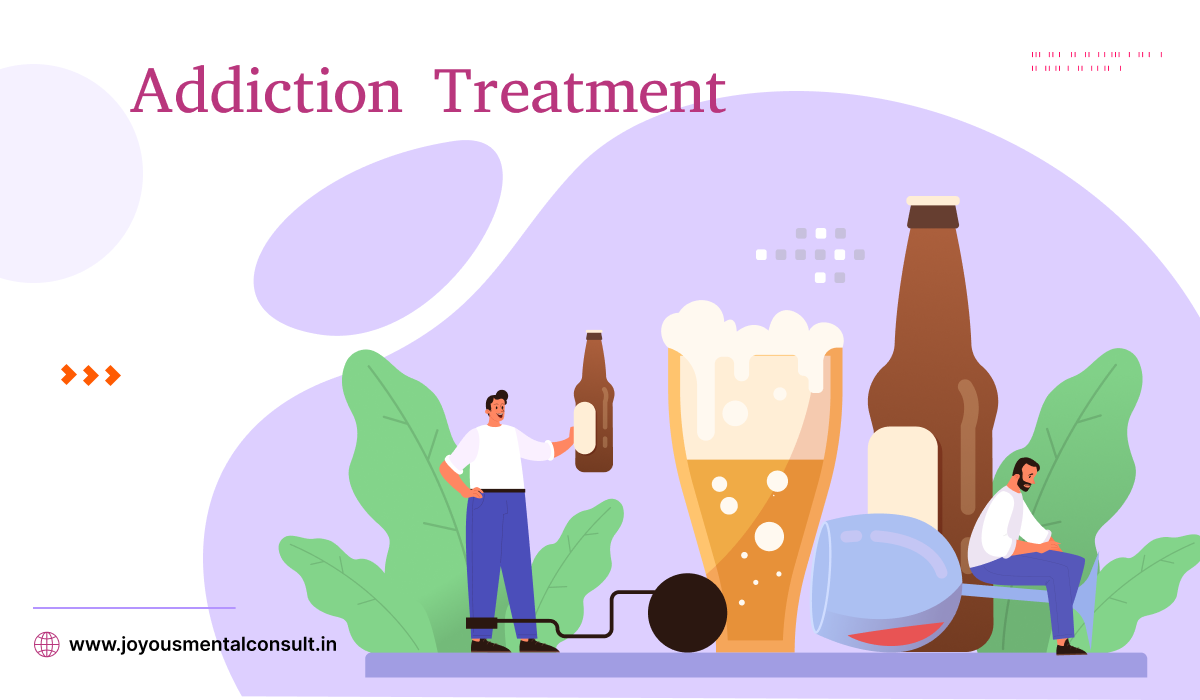What Is Addiction?
A complicated and enduring brain illness called addiction is characterised by compulsive and destructive behaviours. It frequently involves using drugs or alcohol, participating in gambling or video games, or even having a mobile phone addiction. Regardless of origin, age, or gender, it can have an impact on everyone. Due to the structural and functional alterations in the brain, it is regarded as a medical disorder.
Features of Addiction
Addiction has the following traits:
Compulsion: Addicts have a strong and uncontrollable desire to engage in their addictive behaviour while being aware of the consequences.
Loss of Control: Despite their best efforts, people who are addicted find it difficult to control or limit their addictive behaviour.
Yearning: A person experiences a strong, ongoing need or yearning for a substance or activity, which makes it challenging for them to pay attention to other elements of their lives.
Negative Effects: Addiction frequently has negative effects on one’s health, relationships, career, and finances, among other aspects of one’s life.
Tolerance: People may gradually need more of a substance or activity to get the same pleasurable effects, which can result in an increase in consumption.
Types of Addictions
There are many different addictions, and they can be broadly grouped into the following categories:
(A) Substance Addictions
- Alcohol Addiction: Alcoholism is described as an uncontrolled excessive intake of alcohol, resulting in bodily and mental dependence. This habit of consuming results in physical and psychological dependence on alcohol. It is a complex and varied contamination that can seriously impair someone’s bodily, social, and ordinary well-being.
- Drug Addiction: Addiction to a lot of substances, accompanied by heroin, cocaine, prescription medications, or illegal capsules. It is a critical problem which could have an effect on people from many areas of lifestyles. Drug use may have a tremendously poor effect on relationships, relationships with others, and trendy proper-being.
(B) Behavioral Addictions
- Gambling Addiction: A continual, overwhelming impulse to gamble for those reasons both economic and emotional hassle. The delight of the gamble commonly overshadows the consequences it gives you, and this compulsive impulse often takes people down a dangerous course.
- Internet/Technology Addiction: Excessive net, online game, or social media use that interferes with each day’s tasks and responsibilities. For human beings and their everyday lives, this problem can also have extreme negative effects.
- Food Addiction: Compulsive eating or binge munching too much is frequently related to obesity and other fitness issues. This behaviour is characterized by means of devouring a variety of food quickly. During the ingesting episode, the person will frequently feel out of manipulation.
(C) Psychological Addictions
- Video Game Addiction: Excessive gaming has a horrific impact on relationships, employment, and everyday life. This compulsive behaviour can cause a serious response of trouble not only harm the addict but also for those close to them.
- Social Media Addiction: A compelling want to use social media systems and be related to them constantly. A paradigm shift in how we interact, percentage records, and create relationships has been introduced approximately with the useful resource of the appearance of the virtual age.
(D) Other Types of Addiction
- Nicotine Addiction: Tobacco dependence, especially in regard to cigarettes. Understanding the complexity of tobacco dependency is crucial for successful prevention and cessation efforts because of the truth cigarette smoking is a main motive of sicknesses that can be averted and premature mortality.
- Caffeine Addiction: Using caffeine-containing objects excessively could bring bodily and mental dependence. A person’s fitness and well-being may additionally suffer from a number of poor repercussions due to this infection.
- Self-Harm Addiction: A compulsive urge to harm oneself bodily, frequently as a coping mechanism for intellectual agony. Cutting, burning, scraping, hitting, or other forms of self-inflicted physical harm are only a few examples of the way this behaviour may additionally show up.
How Does the Team at Joyous Mental Consult Help?
At Joyous Mental Consult, we comprehend that combatting an addiction may be difficult and intensely personal.
1. Personalised Treatment Program: We understand that every individual’s experience with addiction is different. Because of this, we customise our treatment strategies to fit your unique requirements and situation.
2. A sympathetic and considerate approach: We approach the treatment of addiction with compassion and empathy. We are aware of the difficulties associated with addiction and the bravery required to seek assistance. We offer a secure environment.
3. Relapse Prevention: We are confident that long-term recovery is possible and we give you the resources you need to avoid relapsing.
4. Support ongoing: We dedicate ourselves to helping you recover even after you leave our program. We provide aftercare and continuing assistance for your successful and sustained return to regular life.
We at Joyous Mental Consult are confident in your ability to beat addiction and live a happy life. Our team comprises one of the Best Psychologist in Jaipur. Our team commits to accompany you on this journey and will provide unwavering support along the way. Make contact with us right away to begin your journey.
